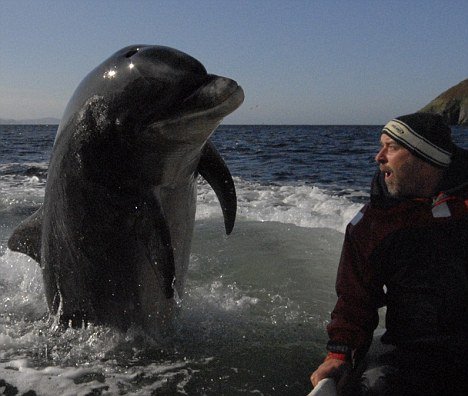
A coalition of experts named Helsinki Group say dolphins are so intelligent that they should be thought of as “non-human persons” and given their own bill of rights.
Helsinki Group includes scientists, philosophers and animal welfare groups have come up with a declaration of dolphin rights which they hope will one day be enshrined in law.
This would stop them being kept in zoos and waterparks, and being attacked by fishermen.
Whales would also be elevated above other animals by the list of rules, leading to whalers being classed as murderers, the American Association for the Advancement of Science’s annual conference heard in Vancouver.
Whale watching trips would be subject to regulations which would respect the creatures’ privacy, and developers and oil companies would have to give huge consideration to the effect their projects would have on the animals’ life and culture.
Philosopher Thomas White said: “Scientific evidence is now strong enough to support the claim that dolphins are, like humans, self-aware, intelligent beings with emotions and personalities.
“Accordingly, dolphins should be regarded as <<non-human persons>> and valued as individuals. From an ethical perspective, the injury, deaths and captivity of dolphins are wrong.”
Those who drew up the bill of rights are known as the Helsinki Group and include UK members of the Whale and Dolphin Conservation Society.

Helsinki Group say that thanks to advances in science, it is clear that dolphins are extremely intelligent, complex and sensitive mammals.
The bill of rights states that every individual member of the cetacean order – whales, dolphins and porpoises – has a right to life.
It also says that no one has the right to own the creatures or to do anything that undermines their rights, freedoms or norms.
Its authors are using the Vancouver conference to try to get more scientists and members of the public on their side. They believe this is a step towards eventually persuading governments to enshrine the principles in law.
When brain weight is compared with body weight, the dolphin has the second-largest brain on the planet after humans.
The conference heard that dolphins are self-aware – they can recognize themselves in the mirror.
There are also examples of them grieving for lost calves, feeding ailing pod mates and co-operating with fishermen when there is a meal in it for them.
In Laguna, Brazil, when a shoal of fish enters the lagoon, the dolphins herd it towards the fishermen. Any fish that escape their nets provide an easy meal.
At Dingle, south-west Ireland, a bottlenose nicknamed Fungi regularly entertains sightseers in boats.
Perhaps the most striking example of dolphin intelligence involves Kelly, a member of a pod at the Institute for Marine Mammal Studies in Mississippi which were rewarded with fish for clearing up litter from their pool.
Each piece of litter equated to one fish. To raise her intake of fish, Kelly tore the litter into pieces and presented them one by one.
One day, she caught a gull and was given a large haul of fish for her efforts.
She then started to use the fish she won for litter picking to lure gulls into her jaws.
She also taught the tactic to her calf, which passed it on to other youngsters in the pod.
- Given the opportunity, dolphins will watch TV and follow instructions delivered on the screen. Chimps do this only after months of training.
- Dolphins can be taught to understand human words, sentences and demands.
- Like humans, dolphins are altruistic and there are examples of them going to the aid of swimmers and surfers attacked by sharks.
- They use body language. The “side-flop”, jumping clear of the water and landing on their side, is thought to mean: “I want to go now.”
- They have regional accents, with the whistles made by those off Wales different to those living off the Irish coast.
- They have a form of adult onset diabetes but are able to turn it on and off. Learning how they do this could lead to new treatments for the human form of the condition.
- Males woo females by presenting them with gifts from bouquets of weed to sticks and lumps of marine debris.